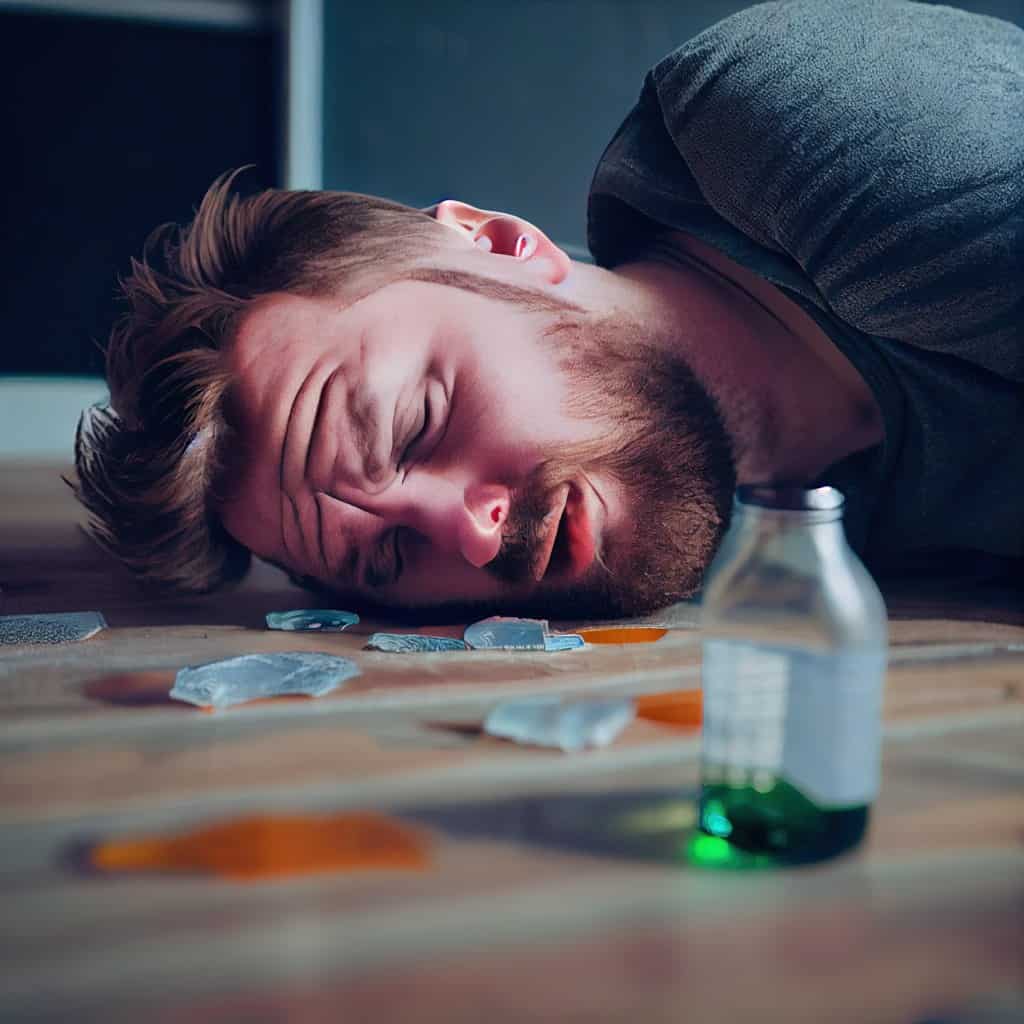Binge drinking is unsafe and can cause serious health matters like liver failure and mental damage in the long run. It also affects relationships, job and studies. To stop it from getting out of hand, one must take action.
This article will look at ways to control binge drinking and avoid further problems. Different approaches and solutions will be examined to help prevent binge drinking.
Reflection on my own experience with binge drinking
At college, I gained a reputation as a “party guy”. I’d often over-indulge in alcohol at social events. Weekends were the worst – I’d binge drink on Thursday, Friday, Saturday and sometimes Sunday. It felt like I was stuck. Though I had fun with my friends, it started to hurt my physical and mental wellbeing.

So, I asked myself – how do you stop drinking before things get too serious? After exploring various solutions and speaking to medical experts, here are some of the solutions that I tried:
- Set a limit – Before going out for drinks, decide how many you’ll have. This way, you won’t be tempted when you’re out.
- Stick to one type of alcohol – If you’re sensitive to certain types of alcohol, stick to one type. Don’t mix them. This will help you keep your consumption in check.
- Alternate alcoholic drinks and water – Alternate each alcoholic drink with a glass of water. This will help you slow down and stay hydrated.
- Find an accountability partner – Have someone with you when you drink. They can remind you when it’s time to switch to water or take breaks between drinks. An accountability partner can also help you regulate your drinking habits.
Definition of binge drinking
Binge drinking is over-consuming alcohol in one session. This may not be with the intent to get drunk, however it can lead to higher levels of intoxication. When participating in activities like parties or festivals, binge drinking can become a huge issue. It can cause health risks, issues in relationships and problems at work.
The risks of binge drinking include: impaired judgment, vomiting, blackouts and unsafe behavior. Long-term effects can include liver damage, strokes and certain types of cancer.
To stop binge drinking, one must recognize the warning signs. This includes being conscious of the amount and frequency of alcohol consumed. Also, take note if family members express concern. Other signs include changes in behavior such as difficulty controlling emotions or neglecting responsibilities. This can be a result of alcohol use and hangovers.
Causes of Binge Drinking
Binge drinking is a major problem which lots of people suffer from. It is vital to recognize what triggers this type of drinking, to assist in stopping it before it becomes too extreme. Knowing the source of binge drinking could be the beginning of controlling it and living a healthier life.
Here are some of the causes that can lead to binge drinking:
Stress and anxiety
Stress and anxiety can lead us to binge drinking. We might use alcohol to numb our feelings or avoid thinking about our problems. For instance, when we’re feeling overwhelmed by work or school, our family, or financial obligations — anything making us feel chronic stress — we may turn to alcohol as an escape. But this isn’t a lasting solution and could cause deep issues from overconsumption.
Social pressure can also contribute to stress-induced binge drinking. If we’re around people who drink a lot, it may seem easier and more accepted to go along with them, even if it means drinking too much. This kind of peer pressure can lead to bad consequences. It’s best to talk to our trusted friends about drinking habits. This way, we can avoid any permanent damage caused by overindulgence.
Peer pressure
Peer pressure can be a major factor in binge drinking, especially for teens and young adults. When peers are drinking too much or making it seem okay, it can be hard to say no or not overdo it.
To fight peer pressure-driven binge drinking, talk to your friends about why you don’t want to drink and spend time with people who accept your decision. If the peer pressure continues, try avoiding events where alcohol is served. Remember, true friends will still accept you even if you don’t drink – if not, find a better group.
Low self-esteem
Low self-esteem is often a cause of binge drinking. When feeling down, drinking can numb negative feelings such as shame and insecurity. It can also make up for a lack of confidence or difficulty connecting with people. This can come from past trauma or abuse, family dynamics or not coping with life.
To solve this, people with low self-esteem must look at their thoughts and feelings. See if they are trying to mask bad feelings or avoid uncomfortable situations. Recognizing this is the first step to improving self-worth.
Many people try binge drinking, but it is important to recognize when it is a problem. Seek help, talk about experiences, practice healthy lifestyle habits, do things that boost serotonin and explore creative outlets like journaling or painting. These can all help combat episodes of excessive alcohol consumption.
Signs and Symptoms
Are weekend binges getting too much? Binge drinking can be hard to stop. But, you can detect it if you know the signs. Examples include drinking more than usual or trying to hide your drinking from people close to you.
Let’s take a closer look at these signs.
Changes in behavior
When it comes to binge drinking and addiction, behavior is key. Here are behaviors that can be signs of a dangerous dependence:
- Drinking more than usual, or in an unexpected way;
- Making excuses for drinking;
- Ignoring other tasks to drink;
- Drinking alone;
- Hiding drinking habits.
Also look out for changes in:
- Social activity;
- Physical health;
- Mental state;
- Emotional well-being;
- Financial status.
Look out for:
- Changes in friends, work or school performance;
- Behaviour towards others when trying to stop;
- Headaches & nausea after heavy drinking;
- Reduced interest in activities.
Physical changes
Binge drinking can cause unpleasant physical changes, like nausea, vomiting and headaches. Too much alcohol in a short time can result in dehydration, fatigue, and dizziness. In severe cases, someone may even pass out or go into a coma, or even die.
In the long-term, binge drinking may damage vital organs like the liver and kidneys, and increase the risk of stroke or cardiac arrest. It can also raise blood pressure, making it hard for the heart to pump blood around the body, potentially leading to heart failure or atrial fibrillation.
Nutritional deficiencies, such as low thiamine levels, which are important for energy production and alcohol recovery, can also occur. Chronic binge drinkers are more likely to become alcohol dependent, so early intervention is key.
Emotional changes
Binge drinking can cause emotional changes. These may include mood swings, sadness and even depression. You might also become defensive, not wanting to talk about it and avoiding alcohol-related activities.
When emotions become overwhelming, it’s time to make changes. If you’re feeling anxious or agitated for no reason, this could be a sign of a potential drinking problem.
Recognizing the emotional changes is key. Take steps to address them before they get worse. If you’re ready to change your relationship with alcohol, reach out for help today. This will help you start on a path towards recovery and better emotional health.
Strategies to Stop Binge Drinking
Binge drinking? A risky game. Long-term consequences and even death can be the result. Do you or someone else have a drinking problem? Find help.
Here are a few tips to help get binge drinking under control, or even quit it:
- Take Initiative.
- Seek Solutions.
- Find Support.
Set realistic goals
To stop binge drinking, setting realistic goals can help. Start by deciding a long-term goal of how much to reduce drinking. For example, limit drinks each week or don’t drink on certain days.
Then set shorter-term goals to reach the long-term goal. Say, if the long-term goal is to not drink on weekends, start with one alcoholic beverage a few nights a week. Doing this can spur you on to reach the ultimate target.
Success and accomplishment can be separated from failure or relapse. Sometimes failure is beneficial as it reaffirms commitment to creating healthier habits. This helps us identify what strategies are effective in controlling problematic alcohol use.
Find healthier coping mechanisms
It’s important to find better coping mechanisms than drinking alcohol. Change can be tough but it’s worth it. Take a break from things you usually do. Look for new activities that bring joy and relaxation. Photography, meditation, pottery, exercise, walking, book clubs, lectures, cooking courses, yoga…anything that’s peaceful and not destructive.
Socializing without alcohol is possible! Connect with friends and family. Have coffee dates instead of drinks. Focus on self-care. Get good sleep. Cook nice meals. Make a plan of healthy habits to reduce stress. Journal, write stories, and get to know yourself better.
Seek professional help
Trying to quit binge drinking? Professional help is a great option. If you can’t do it alone, get support from a medical or mental health care professional. They can diagnose any mental health issues linked to your drinking. An addiction specialist can provide individual or group therapy to help stop the behavior.
Talking with a professional may seem scary. But they’re there to help. Through counseling, therapy, and support, you’ll have the resources to understand how your mental health affects your drinking. You’ll also learn tips on how to prevent heavy drinking and relapse.
Avoid triggers
Pay attention to your thoughts before, during and after drinking. Emotions such as discomfort, sadness, anger or stress could cause you to drink more. Find strategies to deal with these feelings. For example, go for a walk, call someone close, meditate or practice mindfulness. Create a plan to help you cope with triggers.
Before you binge drink, make sure you have eaten. Have regular meals and snacks with protein and healthy carbs. This helps your body recover faster. Reduce your intake of caffeine as it can increase blood pressure and heart rate.
Avoid places where people are likely to overdrink. For example, clubs or bars. Find an environment free from temptation, like a park or beach. Connect with people who share the same goals about drinking. This will help you hold yourself accountable.
Conclusion
To wrap up, binge drinking can be harmful. Pay attention to any warning signs and take action to stop it fast. Quitting may be tough, but there are lots of resources to help.

If you want to control your binge drinking, keep in mind that you have the strength and capability to make changes and lead a healthier life.
Reflection on the journey to sobriety
Recalling the journey to change my binge drinking habits, I now see it was much longer and more complex than I first believed. Knowing facts and stats is important but there is no one-size-fits-all way to deal with this issue. Everyone has different reasons for drinking too much, and many paths to staying in control. A “binge” does not appear suddenly—it builds up over time, so recognizing early warning signs of unhealthy drinking is key.
It is important to have accountability from friends or family. Talking to someone, like a coach, gives you a chance to reflect and learn moral insight. You can also learn strategies to change your drinking habits, like setting limits or advocating for yourself when offered drinks.
The journey of sobriety is full of ups and downs. I’ve experienced feelings of failure due to setbacks, but I’m gradually moving forward. Binge drinking does not have to be accepted, we can be brave enough to hold ourselves accountable and ask for help.
Are you ready to begin your journey?
At the end of the day, this article is just a bunch of words. It might not seem like it can change anything. But if you’re struggling to control your drinking, it’s gonna get better. You are more powerful than any mistake you make. Even if it takes a few times before we learn and grow from them.
Changing drinking habits starts with understanding and awareness. Acknowledge you have a problem, then take steps to prevent further incidents.
It takes willpower and personal accountability to change bad habits. Always remember why you want to change. It takes dedication and hard work. Don’t be afraid to ask for help. Support groups and professional help can be useful.
Take a break and reflect on your choices. It helps us gain perspective. Life should be about progressing, not repeating our mistakes.

